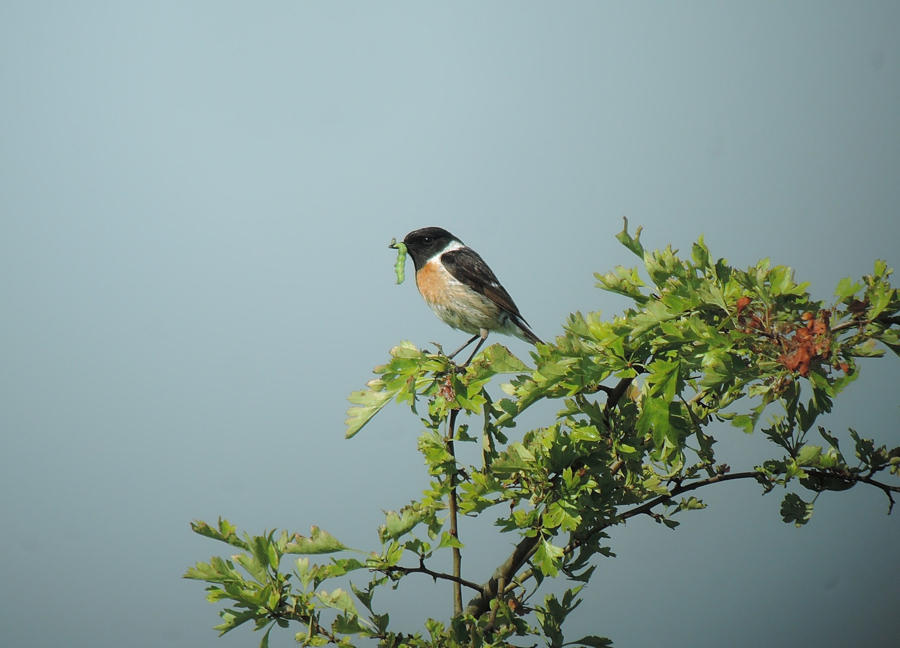Press Releases Archive
12.10.2022
Farmland birds best protected by leaving fallow areas for two or more years, letting native plants grow
University of Tübingen presents Europe-wide study - fallow land should be left at least twice as long as required under German plan
Fallow land is effective in protecting wild birds - but only if it remains undisturbed for at least two years, according to a study by Julia Staggenborg and Nils Anthes from the Institute for Evolution and Ecology at the University of Tübingen. The study evaluates 143 previous research papers, making it one of the most comprehensive studies to date in Europe on the protection of farmland bird species.
Over the past forty years, populations of farmland birds in Europe have plummeted by an average of 56 percent, and by as much as 90 percent for some species such as the partridge. Grain-eaters such as the tree sparrow and the yellowhammer can no longer find enough food because hardly any grain remains in the fields after harvesting with modern machines. Pesticides and land consolidation have suppressed wild herbs and cut back unused habitats such as verges, embankments and grassy paths, which are not useful for agricultural production but which are essential for the survival of insects and the rearing of chicks.
The EU has introduced new conditions under its next five-year agricultural funding period, beginning January 1, 2023. Under the new EU law, farmers will have to set aside four percent of their fields and meadows for biodiversity conservation and will only receive financial support if this condition is met. “This regulation is a great opportunity for species conservation," says Staggenborg, "but these areas should be reserved for measures that are truly effective for biodiversity conservation according to scientific evidence."
The details of how the fallow areas are kept is regulated by the member states themselves as part of a national strategy. The German government’s draft calls for the land to be left fallow for a maximum of one and a half years. Exemptions allow farmers in Germany to shorten that to less than a year. "Many insects cannot complete their reproductive cycle in this short time from summer to the following spring. That means there is less food for breeding birds," says Nils Anthes. The new research confirms that farmland birds benefit significantly more from perennial fallows than from merely annual ones.
The German draft requires farmers to temporarily set aside land, but allows it to be planted with the mixed seeds of just a few species - for example, clover and mustard, or with "flowering mixtures" containing non-native plants such as sunflower, heliotrope, dill and Persian clover. Their tall, dense growth suppresses weeds and is therefore popular with farmers. "However, it is much more effective for preserving biodiversity to simply let wild field weeds sprout," says Nils Anthes. "These native plant species are needed by many of our insects and provide optimal breeding sites for farmland birds." Wild growth would create a diverse coexistence of grasses, flower-rich herbs and patches that would be left completely bare, he says. This would provide birds with enough food, shelter and nesting places.
In addition to perennial fallows, the researchers showed that birds can be protected by farmers mowing their meadows late in the year, or by leaving a strip of grain when harvesting, as required by law in the U.K., so that birds can find enough to eat through the winter.
Publication
Staggenborg, J., Anthes, N. (2022): Long-term fallows rate best among agri-environment scheme effects on farmland birds – A meta-analysis. Conservation Letters, e12904, https://conbio.onlinelibrary.wiley.com/doi/10.1111/conl.12904
Contact:
Dr. Nils Anthes
University of Tübingen
Institute of Evolution and Ecology (EvE)
Phone +49 7071 29-74617
nils.anthesspam prevention@uni-tuebingen.de
Contact for press:
Eberhard Karls Universität Tübingen
Public Relations Department
Dr. Karl Guido Rijkhoek
Director
Tilman Wörtz
Press Officer
Phone +49 7071 29-76788
+49 7071 29-78622
Fax +49 7071 29-5566
karl.rijkhoekspam prevention@uni-tuebingen.de
tilman.woertzspam prevention@uni-tuebingen.de
All press releases by the University of Tübingen

